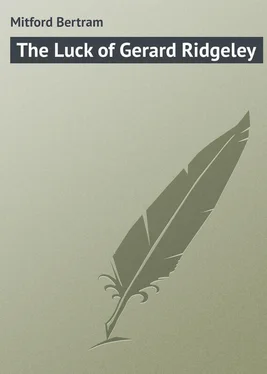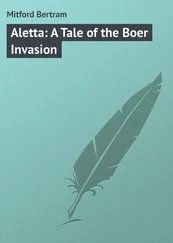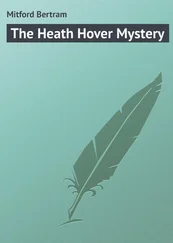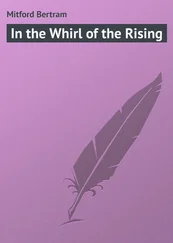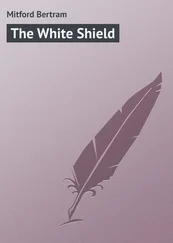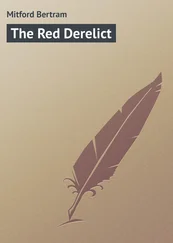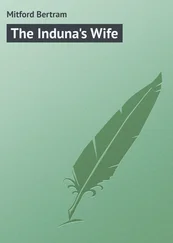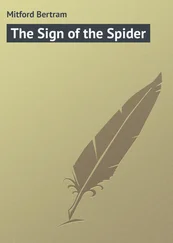Bertram Mitford - The Luck of Gerard Ridgeley
Здесь есть возможность читать онлайн «Bertram Mitford - The Luck of Gerard Ridgeley» — ознакомительный отрывок электронной книги совершенно бесплатно, а после прочтения отрывка купить полную версию. В некоторых случаях можно слушать аудио, скачать через торрент в формате fb2 и присутствует краткое содержание. Жанр: foreign_prose, на английском языке. Описание произведения, (предисловие) а так же отзывы посетителей доступны на портале библиотеки ЛибКат.
- Название:The Luck of Gerard Ridgeley
- Автор:
- Жанр:
- Год:неизвестен
- ISBN:нет данных
- Рейтинг книги:5 / 5. Голосов: 1
-
Избранное:Добавить в избранное
- Отзывы:
-
Ваша оценка:
- 100
- 1
- 2
- 3
- 4
- 5
The Luck of Gerard Ridgeley: краткое содержание, описание и аннотация
Предлагаем к чтению аннотацию, описание, краткое содержание или предисловие (зависит от того, что написал сам автор книги «The Luck of Gerard Ridgeley»). Если вы не нашли необходимую информацию о книге — напишите в комментариях, мы постараемся отыскать её.
The Luck of Gerard Ridgeley — читать онлайн ознакомительный отрывок
Ниже представлен текст книги, разбитый по страницам. Система сохранения места последней прочитанной страницы, позволяет с удобством читать онлайн бесплатно книгу «The Luck of Gerard Ridgeley», без необходимости каждый раз заново искать на чём Вы остановились. Поставьте закладку, и сможете в любой момент перейти на страницу, на которой закончили чтение.
Интервал:
Закладка:
But from Pinetown to Pietermaritzburg is no great distance even for a bullock-waggon, and on the afternoon of the second day they came in sight of the capital, an area of blue gums and straggling iron roofs, lying in a vast hollow. Both were unfeignedly sorry that the journey was over. They felt like being cast adrift again, and said as much to their new friend as they took a right cordial leave of him.
“Well, I’ve been very glad to have you,” said the latter. “Been sort of company like. What do you think you’re likely to be doing with yourselves now you are here, if I may ask?”
“I want first of all to find out a relative of mine,” said Gerard. “I’ve a letter to him. Anstey, his name is. Do you know him?”
A queer smile came into the transport-rider’s face at the name.
“Anstey, is it?” he said. “So he’s a relation of yours? Well, he’s easily found. He runs a Kafir store out beyond Howick, near the Umgeni Fall. Does he know you’re coming?”
“He knows I’m coming some time, but not to the day.”
Again that queer expression in John Dawes’s weather-beaten countenance. Gerard thought nothing of it then; afterwards he had reason to remember it.
“Umjilo’s the name of his place. You can’t miss it. Well, good-bye, both of you. We may knock up against each other again or we may not; it’s a ram world, and not a very big one either. I wish you good luck. I’ll send your traps down first thing in the morning.”
With which adieu, cordial if practical, John Dawes turned away to greet a batch of old acquaintances who had just hailed him; while his late passengers took their way townwards, both agreeing thoroughly upon one point, viz. that the transport-rider was “a downright real jolly good fellow.”
Chapter Five.
Anstey’s Store
“Here! Hi! you two Johnny Raws! What the devil are you doing there, tramping down all my green mealies? Get out of that, will you?” And a volley of curses emphasised the injunction, as the speaker hurried up to the scene of the damage.
The latter was a good-sized mealie patch adjoining the roadside, through whose battered and broken-down fence had plunged a horse – a stubborn and refractory horse withal, whose shies and plunges sorely tried the equilibrium of his unskilled rider. That rider was no other than our friend Harry Maitland. Gerard, who was a better horseman, had kept his steed in the road, and was shouting encouragement to his comrade, who, hot and fagged with a long ride on a somewhat rough animal, now found it all he could do to keep his seat.
The aggrieved proprietor’s voice rose to a perfect yell of fury as he gained the spot and noted the havoc wrought. Mealie stalks were snapping off short, one after the other, and a broad, trampled, and broken patch, as if the place had been roughly mown, marked the passage of the horse. Mad with rage, he picked up a stone.
“Here, drop that, will you?” cried Gerard, warningly.
Too late. The stone whizzed, and striking the horse on the hind quarters, caused that quadruped to kick out wildly. Harry was deposited in a face among the broken stalks, while his steed, thus relieved, tore away snorting and kicking – crashing through the standing crop with a diabolical indifference to the feelings of its owner which made the latter foam again.
“Come out of that!” he raved, as poor Harry began ruefully and rather gingerly to pick himself up. “Come out of it. I’ll have twenty pound out of you for this little bit of fun. But first of all I’m going to give you the biggest licking you ever had in your life, you spick-and-span popinjay masher!”
“We’ll see about that part of the business,” said Gerard, who, seeing the hostile turn of affairs, had dismounted and hitched his bridle to a convenient rail. “If there’s going to be any fighting, it’ll have to be done fair, you understand.”
“What the blazes have you got to say to it anyhow?” cried the man, turning to Gerard, but with something of the light of battle gone out of his unprepossessing countenance as he took in the well-knit frame and determined aspect of his younger opponent.
“Just this,” said Gerard. “My chum there’s shaken by his fall, and I doubt if he’s much good with his fists or a match for you. So if there’s any licking to be done, just start here. See?”
But the man apparently did not see. He hesitated, staring at the speaker, his features working with rage. He was a hard-looking customer of about forty, with shifty eyes and a shaggy sandy beard. His raiment withal was slovenly, consisting of moleskin trousers none too clean, a collarless flannel shirt, also none too clean, and a slouch hat.
“Why don’t you fence your confounded mealie-field, or whatever you call it?” said Gerard, angrily, for although a good-tempered fellow he had all the average young Englishman’s objection to being bullied or crowed over. “You deserve all that’s happened for keeping a place like that practically unfenced, for one can’t call that broken-down thing a fence. And right by the roadside, too! Shouldn’t wonder if it was left that way on purpose.”
The man yelled out a fresh torrent of blasphemy. The last remark had all-unwittingly hit the right nail on the head. That mealie patch was a source of revenue to its owner beyond the mere value of its crop. But he hesitated to come to close quarters.
“Fence or no fence,” he shouted, “I’m going to have twenty pound out of that paper-collared, monkey-headed son of a bandbox. His brute of a horse has done more than twice that amount of damage. So shell out, Shiny-boots!”
Harry, to whom this remark was addressed, though, as his comrade had said, somewhat shaken by his fall, was quite alive to the situation. He realised what a tower of strength lay in Gerard’s thews and sinews, and was not at all unwilling that his comrade should fight his battles for him. So he answered with a spirit born of that confidence.
“Keep your confounded cheek to yourself, you dirty-looking clodhopper. Twenty pounds! Why, I’ll summon you for shying stones at me and starting off my horse. And if he’s lost you’ll have to pay for him.”
“Look here,” said Gerard, “if you think you’ve any claim upon us, we are staying in Maritzburg, at the Imperial. I’ll give you our names and addresses, and you can do what you like. But we are not going to stick fooling around here all day.”
“Oh, you’re not, eh? We’ll soon see about that.” And turning, he began bawling out something in a language they did not understand.
A house stood back from the road. This building they had at first hardly noticed. Now, from around it, a swarm of natives were pouring, about a dozen of whom, leaving the rest, came running down to the scene of the dispute.
“This is getting serious,” said Gerard to himself. “I’m afraid we’re in for a ripe old row.”
The natives had surrounded our two friends. They were mostly well-set-up, stalwart fellows, some clad in European clothes, others wearing only the mútya , a sort of apron which hangs from the loins before and behind. All carried sticks.
The white man was haranguing them vehemently in their own tongue – in fact, binding them to his interests by promises of grog and tobacco. Gerard cast an eager glance up and down the long riband of dusty road, over the shimmering expanse of sun-baked veldt . But in vain. No help need be looked for from outside. He resolved to make one more appeal to reason.
“Look here,” he began.
But the other stopped him short.
“Shut up. We don’t want any more indaba . Are you going to fork out or are you not? because, if not, we are going to take your horse and yourselves too. There are enough of us, you see.”
Читать дальшеИнтервал:
Закладка:
Похожие книги на «The Luck of Gerard Ridgeley»
Представляем Вашему вниманию похожие книги на «The Luck of Gerard Ridgeley» списком для выбора. Мы отобрали схожую по названию и смыслу литературу в надежде предоставить читателям больше вариантов отыскать новые, интересные, ещё непрочитанные произведения.
Обсуждение, отзывы о книге «The Luck of Gerard Ridgeley» и просто собственные мнения читателей. Оставьте ваши комментарии, напишите, что Вы думаете о произведении, его смысле или главных героях. Укажите что конкретно понравилось, а что нет, и почему Вы так считаете.
